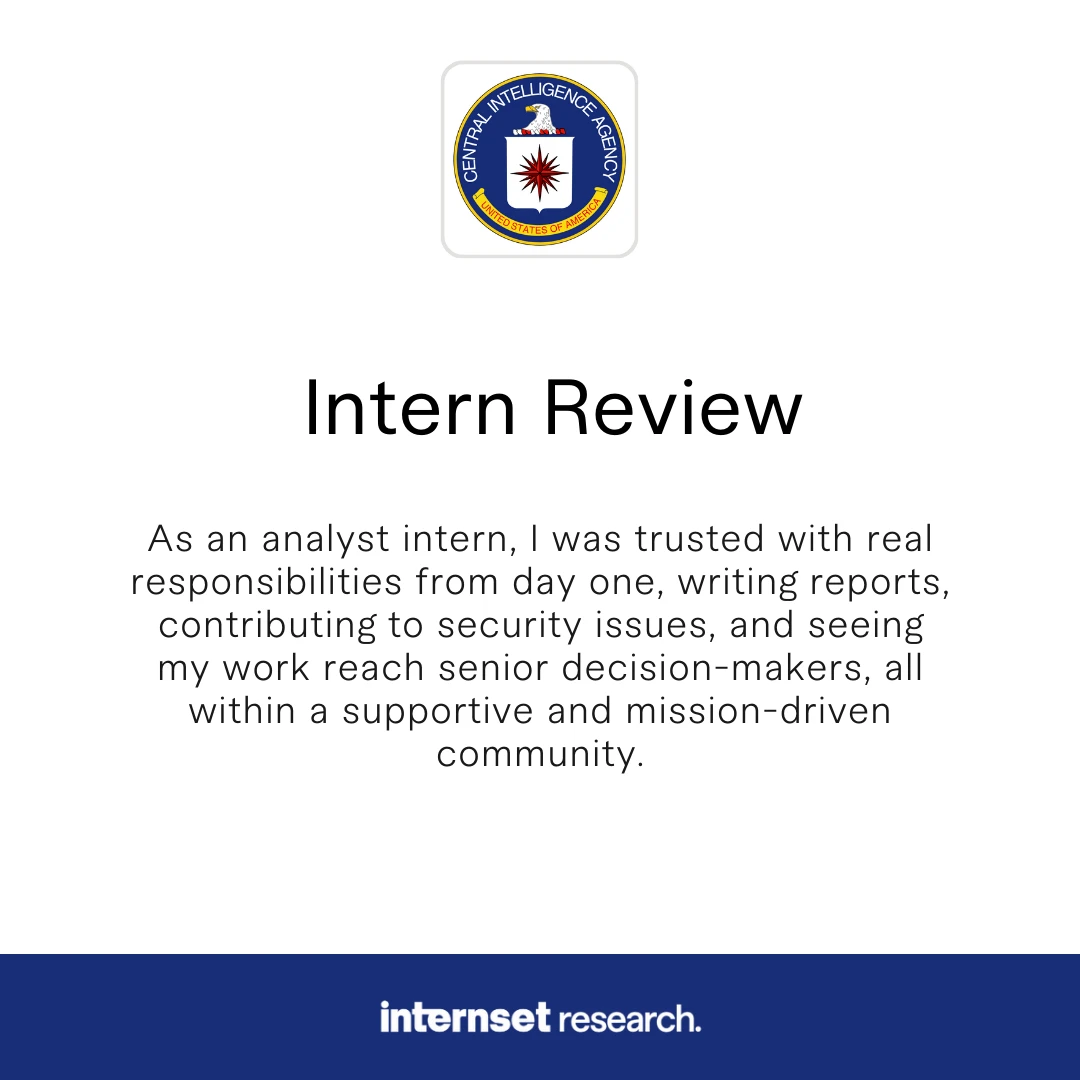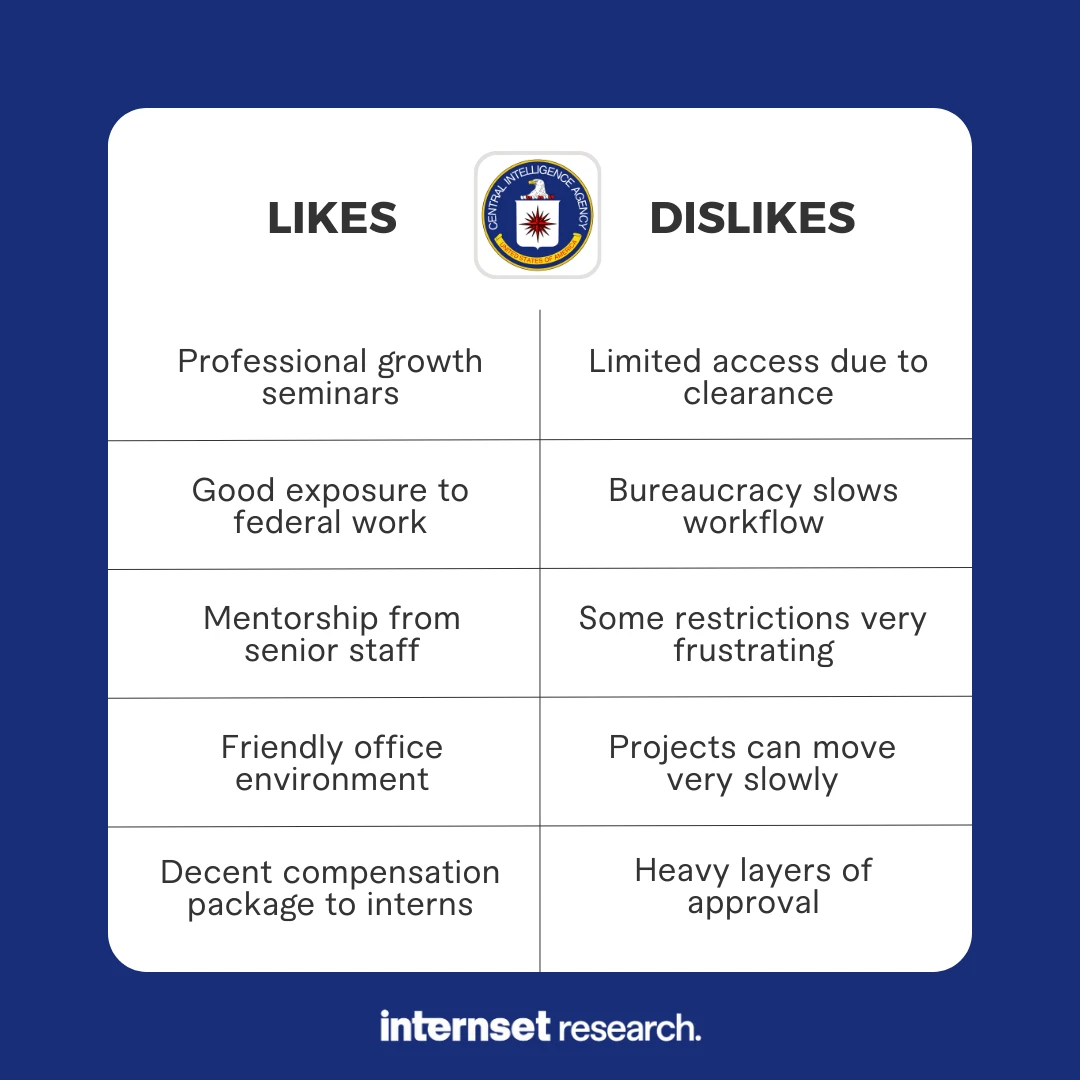


1 Popular internship programs at CIA
CIA’s internship programs are built to attract top students who want a structured path into national security work. These programs are not designed as filler experiences, but as carefully crafted pipelines that combine training, financial support, mentorship, and multi-summer commitments. Each program is aligned to specific disciplines, whether operational, analytical, technical, or business, and they provide clear progression into full-time roles after graduation.
1.1 Stokes Scholarship Program
This flagship program combines financial support with professional experience. It also offers tuition assistance, plus guaranteed paid summer internships at CIA headquarters. What makes it unique is the long-term commitment: students complete multiple summer tours while studying, and upon graduation, they transition directly into full-time positions. This program is designed for students from diverse backgrounds who want financial stability during school while securing a future in intelligence.
1.2 Directorate of Operations Internship (DO Undergraduate Program)
The DO program is structured as a two-summer commitment. Students join after completing at least one semester of college, and they return for a second tour the following year. The program’s design mirrors the career pipeline for operations officers, offering a progressive learning path where students build from foundational knowledge in their first summer to advanced operational exposure in their second. The program’s structure ensures continuity and gives interns a realistic preview of what careers in human intelligence look like.
1.3 Analysis Internship Program
This program is built around the CIA’s Directorate of Analysis, which is responsible for producing intelligence used by senior U.S. leaders. The internship offers structured training in analytic tradecraft, exposure to classified information, and mentorship from career analysts. It is designed to test a student’s ability to think critically, synthesize diverse sources of data, and communicate findings clearly. Interns are integrated into teams and follow a training model that mirrors the career development of full-time analysts.
1.4 Science, Technology, and Engineering Internship
The CIA recognizes that innovation in science and engineering underpins modern intelligence work. This program is built to give STEM students direct access to high-tech projects, advanced labs, and collaboration with government technologists. The structure emphasizes project-based learning, with interns often assigned to specific teams for the summer. The program also introduces interns to classified technologies and methodologies that are not available in academia or the private sector, making it a unique professional development experience.
1.5 Contracting Officer Internship
This program is designed for students in business, economics, and finance who want to learn about federal acquisitions and procurement in a national security environment. It provides structured exposure to the entire contracting lifecycle: from requirements planning to contract negotiation and oversight. Interns rotate through acquisition offices and receive direct mentorship from senior contracting officers. The program is tailored to students considering careers in business who also want to apply those skills in service of the intelligence community.
1.6 Cybersecurity Internship Program
1.7 Foreign Language Internship Program
The language program is structured around the CIA’s need for cultural and linguistic expertise. It offers students immersive training in analytic linguistics, exposure to classified language material, and practice in applying language skills to intelligence problems. The program is not just about translating. It is about developing language professionals who can connect linguistic insights with operational or analytical missions. Structured workshops, cultural seminars, and direct mentorship make this one of the most specialized offerings.
1.8 Business and Finance Internship Program
This program is designed for students in finance, accounting, and economics. It offers structured training in federal financial management, auditing, and resource allocation specific to the intelligence environment. Interns work within the CIA’s finance teams, attend workshops on budgeting and oversight, and learn how financial accountability directly impacts mission outcomes. The program mirrors graduate training schemes in the private sector but with the unique focus of serving national security priorities.
2 Popular roles for interns at CIA
1. Operations Intern: Ops interns are embedded within the Directorate of Operations, the part of the Agency responsible for human intelligence. Instead of staying on the sidelines, interns learn how missions are planned, supported, and executed. They may be involved in developing targeting strategies, supporting case officers, or assisting with operational research that helps identify opportunities overseas.
2. Analyst Intern: Analyst interns are placed in the Directorate of Analysis, where they work on projects that directly feed into intelligence briefings for senior policymakers. The role is highly structured and focuses on applying analytic tradecraft: weighing the reliability of sources, spotting patterns across complex datasets, and building arguments backed by evidence. Interns are expected to write concise intelligence products, contribute to assessments, and sometimes even participate in preparing materials that reach the highest levels of government.
3. STEM Intern: STEM interns work in technical offices that drive the CIA’s innovation agenda. Depending on their field, they may be placed on projects in engineering, computer science, data modeling, materials research, or applied physics. The role is designed for hands-on problem solving. Interns might help design tools to support field operations, build data pipelines for classified systems, or assist in testing new technologies that enhance intelligence collection.
4. Cybersecurity Intern: Cybersecurity interns play an active part in defending the CIA’s networks and classified systems. This role goes beyond textbook exercises. Interns may perform vulnerability testing, analyze attack simulations, or work with advanced defense tools to strengthen mission-critical infrastructures. They might rotate across teams specializing in intrusion detection, network forensics, or cyber operations.
5. Contracting Officer Intern: Contracting officer interns enter the world of acquisitions and procurement, which underpins every CIA operation. This role introduces students to the full contracting lifecycle: drafting solicitation documents, evaluating proposals, and monitoring contract execution. Interns gain exposure to billion-dollar acquisition programs that range from IT systems to large-scale construction projects.
6. Language Intern: Language interns use their fluency to bridge cultural and linguistic gaps that are essential to intelligence work. They are not only translating foreign materials but also analyzing the meaning behind words, idioms, and cultural references. Interns are trained to provide both linguistic accuracy and contextual interpretation, ensuring that policymakers and operations officers understand not just what was said, but why it matters.
7. Finance Intern: Finance interns contribute to the Agency’s ability to manage resources effectively. This role offers hands-on experience in auditing, budget planning, and financial oversight. Interns may work on projects that involve forecasting the financial needs of specific programs, analyzing spending patterns, or supporting audits of sensitive projects.
8. Scholarship Intern (Stokes): Stokes interns balance academic study with structured work tours at CIA headquarters. During summers, they are placed into professional teams that align with their degree focus, whether operations, analysis, STEM, or business. The role offers consistent mentorship and training across multiple years, allowing interns to grow in confidence and expertise.
Related articles:
1. What projects do CIA interns work on in their first weeks?
2. What skills are needed for a cybersecurity internship?
3. What do interns at Sony Music Publishing learn during a cybersecurity internship?